President Wilson’s Address as the US Joins The Great War - 1917
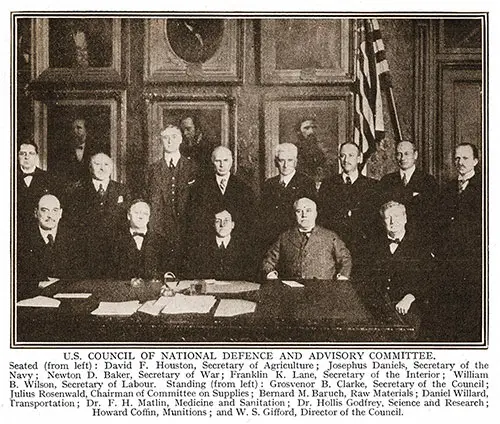
U.S. Council of National Defense and Advisory Committee. Seated (from left): David F. Houston, Secretary of Agriculture; Josephus Daniels, Secretary of the Navy; Newton D. Baker, Secretary of War; Franklin K. Lane, Secretary of the Interior; William B. Wilson, Secretary of Labor. Standing (from left): Grosvenor B. Clarke, Secretary of the Council; Julius Rosenwald, Chairman of Committee on Supplies; Bernard M. Baruch, Raw Materials; Daniel Willard, Transportation; Dr. F. H. Matlin, Medicine and Sanitation; Dr. Hollis Godfrey. Science and Research; Howard Coffin, Munitions; and W. S. Gifford, Director of the Council. The Great War, 12 May 1917. GGA Image ID # 180723eb14
Eminent Republican Leaders Who Supported President Wilson’s War Policy
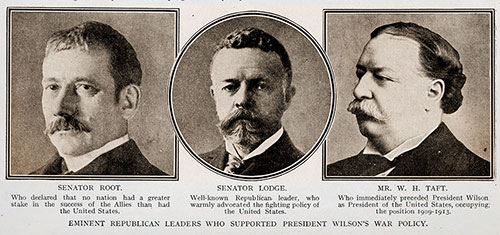
Eminent Republican Leaders Who Supported President Wilson’s War Policy. Senator Elihu Root, Who declared that no nation had a greater stake in the success of the Allies than had the United States. Senator Henry Cabot Lodge, Well-known Republican- leader, who warmly advocated the fighting policy of the United States. Mr. William H. Taft, Who immediately preceded President Wilson as President of the United States, occupying the position 1909-1913. The Great War, 12 May 1917. GGA Image ID # 1807dfdedc
President Wilson was deeply stirred by the unexpected Russian miracle. He at once shortened, by two weeks, the date for the convening of Congress and the declaration of war against Germany. On April 2nd, he asked Congress to declare that a state of war existed between the United States and Germany.
In an address that ranked with the most famous declarations of Lincoln, he carried the country with him in a crusade against all the forces of Prussianism that had perverted the soul of the Germanic race.
Abandoning the policy of armed neutrality which he had advocated on February 26th, 1917, he preached full and strenuous war against the enemies of mankind.
He said:
There is one choice we cannot make and are incapable of making. We will not choose the path of submission and suffer the most sacred rights of our nation and our people to be ignored and violated. The wrongs against which we now array ourselves are not common wrongs; they cut to the very root of human life.
With a profound sense of the solemn event and the tragical character of the step I am taking, and of the grave responsibilities which it involves, but in unhesitating obedience to what I deem my constitutional duty, I advise that Congress declare that the recent
course of the Imperial German Government to be in fact nothing less than war against the Government and people of the United States, that it formally accepts the status of a belligerent which is thus thrust upon it, and that it take immediate steps, not only to put the country in a more thorough state of defense, but also to exert all its power and to employ its resources to bring the Government of the German Empire to terms and end the war.
We are at the beginning of an age in which it will be insisted that the same standards of conduct and responsibility for wrong done shall be observed among nations and their Governments that are observed among individual citizens of civilized States.
We have not quarreled with the German people. We have no feeling towards them but one of sympathy and friendship. It was not upon their impulse that their Government acted in entering this war. It was not with their previous knowledge or approval.
It was a war determined upon as wars used to be determined upon in the old unhappy days when people were nowhere consulted by their rulers, and wars were provoked and waged in the interest of dynasties, or little groups of ambitious men, who were accustomed to use their fellow-men as pawns and tools.
Self-governed nations do not fill their neighbor States with spies, or set in course an intrigue to bring about some critical posture of affairs which would give them an opportunity to strike and make a conquest. Such designs can be successfully worked only under cover, where no one has a right to ask questions.
Cunningly contrived plans of deception or impression, carried, it may be, from generation to generation, can be worked out and kept from light only within the privacy of Courts or behind the carefully-guarded confidences of a narrow, privileged class. They are happily impossible where public opinion commands and insists upon full information concerning all the nation’s affairs.
A steadfast concert for peace can never be maintained except by the partnership of democratic nations. No autocratic Government could be trusted to keep faith within it or observe its covenants. There must be a league of honor and partnership of opinion.
Intrigue would eat its vitals away. Plotting by inner circles, who would plan what they would and render an account to no one, would be corruption seated at its very heart.
Only free peoples can hold their purpose and their honor steady to the common end, and prefer the interests of mankind to the narrow interests of their own.
Does not every American feel that assurance has been added to our hope for the future peace of the world by the wonderful heartening things that have been happening within the last few weeks in Russia?
Russia was known by those who knew her best to have been always in fact democratic at heart in all vital habits, in her thought, and in all intimate relations of her people that spoke of their natural instinct and their habitual attitude towards life.
The autocracy that crowned the summit of her political structure, long as it had stood and terrible as it was in the reality of its power, was not in fact Russian in origin, character, or purpose, and now it has been shaken, and the great, generous Russian people have been added in all their native majesty and might to the forces that are fighting for freedom in the world, for justice, and for peace. Here is a fit partner for a league of honor.
It will be easier for us to conduct ourselves as belligerents in a high spirit of right and fairness because we act without animus, not in enmity towards a people, or with a desire to bring any injury or disadvantage upon them, but only in armed opposition to an irresponsible Government, which has thrown aside all considerations of humanity and right, and is running amok.
We are, let me say again, sincere friends of the German people, and shall desire nothing so much as an early re-establishment of intimate relations to our mutual advantage.
However hard it may be for them for the time being to believe this, it is spoken from our hearts. We have borne with their present Government through all these bitter months, because of that friendship, exercising patience and forbearance which otherwise would have been impossible.
We shall happily still have an opportunity to prove that friendship in our daily attitude and actions towards millions of men and women of German birth and native sympathy who live amongst us and share our life, and we shall be proud to prove it towards all who in fact are loyal to their neighbors and to the Government in the hour of test.
They are most of them as true and loyal Americans as if they had never known any other fealty or allegiance. They will be prompt to stand with us in rebuking and restraining the few who may be of different mind and purpose. If there should be disloyalty it will be dealt with the firm hand of stern repression, but, if it lifts its head at all, it will lift it only here and there, and without countenance, except from the lawless and malignant few.
It is a distressing and oppressive duty, gentlemen of Congress, which I have performed in thus addressing you. There are, it may be, many months of fiery trial and sacrifice ahead of us. It is a fearful thing to lead this great and peaceful people into war, into the most terrible and disastrous of all wars.
Civilization itself seems to be in the balance, but right is more precious than peace, and we shall fight for the things which we have always carried nearest our hearts, for democracy, for the right of those who submit to authority to have a voice in their own government, for the rights and liberties of small nations, for the universal domination of right by such a concert of free peoples as will bring peace and safety to all nations, and make the world itself at last free.
To such a task we can dedicate our lives, our fortunes, everything we are, everything we have, with the pride of those who know the day has come when America is privileged to spend her blood and might for the principles that gave her birth and the happiness and peace which she has treasured.
God helping her, she can do no other.
The distinction which President Wilson made in his address between the autocratic German Government and the unfree German people was a stroke of policy of the highest skill.
It was directly intended for the large, hesitant, and powerful body of German-Americans who were either descended from immigrants rebellious to Prussian rule or were themselves men and women who had left the Central Empires in search of more freedom.
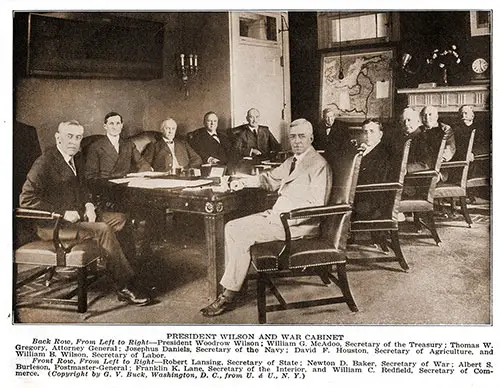
President Woodrow Wilson and His War Cabinet. Back row (left to right): President Wilson; William G. McAdoo, Secretary of the Treasury; Thomas W. Gregory, Attorney-General; Josephus Daniels, Secretary of the Navy; David F. Houston, Secretary of Agriculture; William B. Wilson, Secretary of Labor. Front row (left to right): Robert Lansing, Secretary of State; Newton D. Baker, Secretary of War; Albert S. Burlson, Postmaster-General; Franklin K. Lane, Secretary of the Interior; William C. Kedheld, Secretary of Commerce. The World's Greatest War, 1919. GGA Image ID # 18071f3ff4
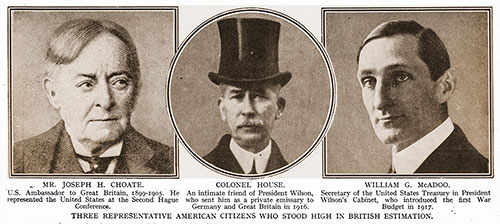
Three Representative American Citizens Who Stood High in British Estimation. Mr. Joseph H. Choate, U.S. Ambassador to Great Britain, 1899-1905. He represented the United States at the Second Hague Conference. Colonel House, An intimate friend of President Wilson, who sent him as a private emissary to Germany and Great Britain in 1916. William G. McAdoo, Secretary of the United States Treasury in President Wilson’s Cabinet, who introduced the first War Budget in 1917. The Great War. 1919. GGA Image ID # 1807e340b5
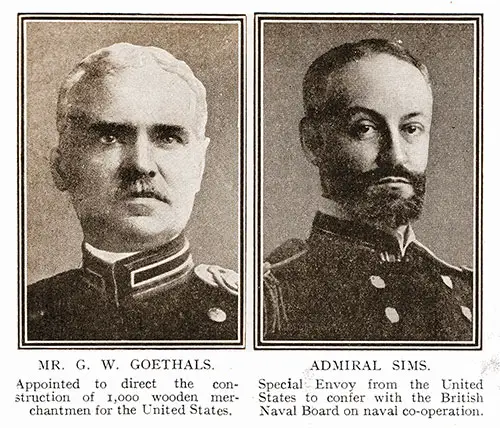
Mr. Goethals and Admiral Sims. Mr. G. W. Goethals, Appointed to direct the construction of 1,000 wooden merchantmen for the United States. Admiral Sims, Special Envoy from the United States to confer with the British Naval Board on naval co-operation. The Great War, 12 May 1917. GGA Image ID # 1808701bb5
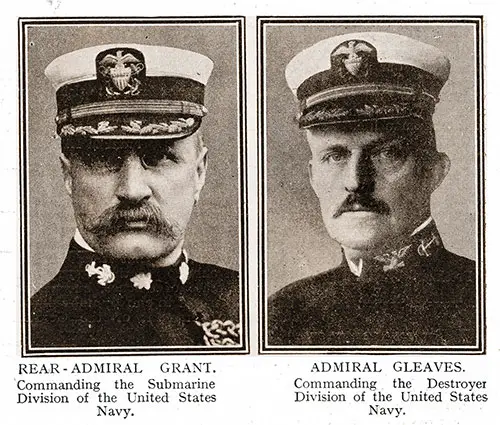
Rear Admiral Grant and Admiral Gleaves. Rear-admiral Grant, Commanding the Submarine Division of the United States Navy. Admiral Cleaves, Commanding the Destroyer Division of the United States Navy. The Great War, 12 May 1917. GGA Image ID # 1808a29cce
"Part 143: The Intervention of the United States," in The Great War: The Standard History of the All-Europe Conflict, London: Amalgamated Press, Limited, Vol IX, Part 143, 12 May 1917.
